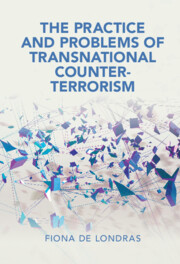Book contents
- The Practice and Problems of Transnational Counter-Terrorism
- Cambridge Studies in Law and Society
- The Practice and Problems of Transnational Counter-Terrorism
- Copyright page
- Contents
- Acknowledgements
- Abbreviations
- Introduction
- 1 The Institutions of Transnational Counter-Terrorism
- 2 The Law of Transnational Counter-Terrorism
- 3 Ever-Expanding Transnational Counter-Terrorism
- 4 Transnational Counter-Terrorism in the Domestic Sphere
- 5 Accountability
- Conclusion
- Epilogue: The Seventh Review of the Global Counter-Terrorism Strategy
- Academic Bibliography
- Index
- Cambridge Studies in Law and Society
4 - Transnational Counter-Terrorism in the Domestic Sphere
Published online by Cambridge University Press: 19 January 2022
- The Practice and Problems of Transnational Counter-Terrorism
- Cambridge Studies in Law and Society
- The Practice and Problems of Transnational Counter-Terrorism
- Copyright page
- Contents
- Acknowledgements
- Abbreviations
- Introduction
- 1 The Institutions of Transnational Counter-Terrorism
- 2 The Law of Transnational Counter-Terrorism
- 3 Ever-Expanding Transnational Counter-Terrorism
- 4 Transnational Counter-Terrorism in the Domestic Sphere
- 5 Accountability
- Conclusion
- Epilogue: The Seventh Review of the Global Counter-Terrorism Strategy
- Academic Bibliography
- Index
- Cambridge Studies in Law and Society
Summary
This chapter demonstrates how transnational counter-terrorism is used to shape, license, and excuse domestic actions that have direct and intimate impacts on the individual and on the relationship between state power and accountability in the counter-terrorism domain. The chapter considers how transnational counter-terrorism disrupts modes of managing the relationship between international and domestic law. It shows that transnational provenance is often used as a proxy for domestic tests of proportionality, constitutionality, and necessity, thus undermining politicisation and national constitutional arrangements. Finally, the chapter considers the impact of transnational counter-terrorism on the relationship between the state and the individual, showing that states routinely capitalise on the impulses and atmosphere of the transnational counter-terrorism order to securitise dissent and opposition, and that transnational counter-terrorism enables states to recast citizens as terrorists whose rights can be treated as forfeited, even where this leaves such citizens in situations of grave vulnerability, including exposure to torture or inhuman treatment.
- Type
- Chapter
- Information
- The Practice and Problems of Transnational Counter-Terrorism , pp. 121 - 153Publisher: Cambridge University PressPrint publication year: 2022

